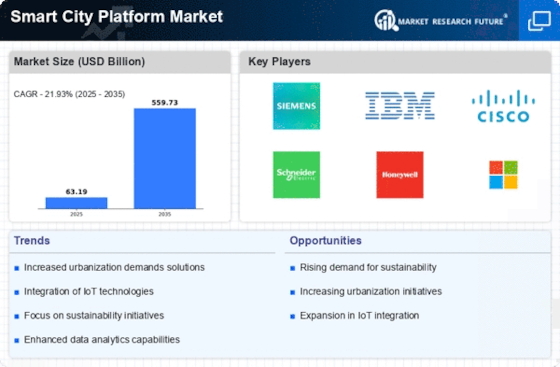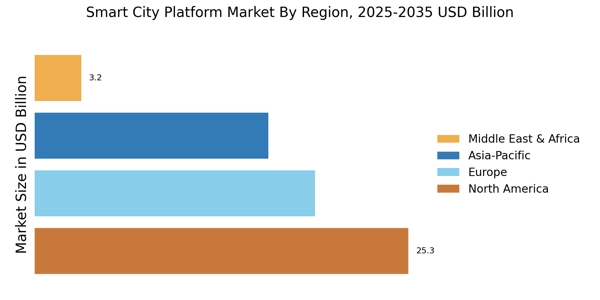Rising Urbanization Trends
The Smart City Platform Market is experiencing a surge due to increasing urbanization trends. As more individuals migrate to urban areas, cities face challenges such as traffic congestion, pollution, and inadequate infrastructure. This urban influx necessitates the implementation of smart city solutions to enhance livability and sustainability. According to recent data, urban areas are projected to house nearly 68% of the world's population by 2050. This demographic shift drives demand for smart city platforms that can efficiently manage resources, improve public services, and foster economic growth. Consequently, municipalities are investing in technologies that facilitate real-time data collection and analysis, which are essential for informed decision-making in urban planning.
Government Initiatives and Funding
Government initiatives play a pivotal role in the Smart City Platform Market. Various governments are increasingly recognizing the importance of smart city solutions in addressing urban challenges. As a result, they are allocating substantial funding to support the development and implementation of smart technologies. For instance, numerous countries have launched smart city programs aimed at enhancing infrastructure, transportation, and public safety. In 2023, it was reported that government investments in smart city projects reached approximately $100 billion, indicating a robust commitment to fostering innovation in urban environments. This financial backing not only accelerates the adoption of smart city platforms but also encourages public-private partnerships, further driving market growth.
Growing Emphasis on Sustainability
The Smart City Platform Market is increasingly driven by a growing emphasis on sustainability. As environmental concerns become more pressing, cities are seeking innovative solutions to reduce their carbon footprint and promote sustainable practices. Smart city platforms enable municipalities to implement energy-efficient systems, optimize waste management, and enhance public transportation. Recent studies indicate that cities adopting smart technologies can reduce energy consumption by up to 30%. This focus on sustainability not only addresses environmental challenges but also improves the quality of life for residents. As a result, the demand for smart city solutions that prioritize sustainability is expected to rise, further propelling market growth.
Advancements in Communication Technologies
Advancements in communication technologies are significantly influencing the Smart City Platform Market. The proliferation of 5G networks and the Internet of Things (IoT) is enabling cities to deploy smart solutions that require high-speed connectivity and real-time data exchange. These technologies facilitate the integration of various smart city applications, such as intelligent transportation systems, smart grids, and public safety solutions. As of 2025, it is estimated that the number of connected devices in smart cities will exceed 50 billion, creating vast opportunities for data-driven decision-making. The enhanced connectivity provided by these advancements allows for seamless communication between devices, which is crucial for the effective functioning of smart city platforms.
Increased Demand for Enhanced Public Services
The Smart City Platform Market is witnessing increased demand for enhanced public services. Citizens are becoming more vocal about their expectations for efficient and responsive public services, prompting cities to adopt smart technologies. These platforms facilitate the delivery of services such as waste management, public safety, and transportation in a more efficient manner. Data from recent surveys suggest that over 70% of urban residents prioritize improved public services as a key factor in their quality of life. Consequently, municipalities are investing in smart city solutions that leverage data analytics and IoT to streamline operations and enhance service delivery. This trend is likely to continue, driving further growth in the smart city platform market.


















